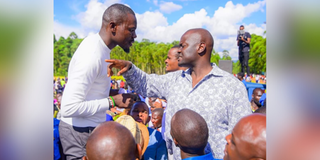
South Mugirango MP Silvanus Osoro and his Kitutu Chache South counterpart Anthony Kibagendi during a church function in Bomachoge Borabu, Kisii County. The event was marred by conflict.
The ugly fistfight between Kisii political leaders last week is the latest testament to the ‘unholy alliance’ between the church and politicians. The horrid display of political rivalry within the walls of the holy sanctuary is a clear indication that the church has failed to completely disassociate itself from politics.
Politicians and churches, especially evangelicals, are tied at the hip with handouts at the heart of a troublesome marriage of convenience.
The Kisii incident involved politicians from both the Kenya Kwanza and Azimio factions who had been invited for a funds drive at Etono Pentecostal Assemblies of God (PAG) Church in Bomachoge Borabu. However, the event soon turned ugly when political temperatures started rising between the rival camps with the differences spilling to the pulpit.
Chaos soon took centre stage as the politicians clashed, which left several people nursing injuries. “Respect our God even if you are helping us. We have a way we worship our God. We want money only and if you don't want to give us money please you are free don't worry,” said PAG National General Secretary Richard Obwoge.
The ugly incident shows how politicians have managed to run roughshod over the church using their hefty donations. The pulpit has been turned into a platform for spewing hatred, division, discord and blatant lies with the often packed congregation offering a ready audience.
But even after moving to ban politicians from the pulpit in 2021, the two have been unable to keep a safe distance from each other, losing the control they had in the early 1990s at the height of the clamour for a return to multiparty democracy. The Catholic Church banned politicians from the pulpit in 2021.
The move was then followed by the Anglican Church in Kenya. At the time, the Anglican head, Archbishop Jackson Ole Sapit, said it was a mistake to grant politicians a say in churches.
Two years earlier, while speaking in a multi-sectoral initiative against corruption, Mr Sapit had warned ACK clerics against accepting dirty money. “Let us not allow harambee money to become a subtle way to sanitise corrupt leaders,” said the Archbishop at the time.
Nyeri Diocese Archbishop Anthony Muheria concurred, saying the clergy are partly to blame for the capture of the church by politicians. Nevertheless, evangelical and Pentecostal churches, have continued to see nothing with accepting money from politicians. Interestingly, the two have failed to ban politicians from fundraising events, ostensibly for development of church projects.In the 1990s, the church dabbled in politics of the day but albeit for different reasons. The firebrand clergies of the time were fierce in their fight against dictatorial tendencies of the Kanu regime. Archbishop David Gitari (ACK), Archbishop Raphael Ndingi Mwana a’Nzeki of the Catholic Church and retired Rev. Timothy Njoya of the Presbyterian Church of East Africa (PCEA) fought for democracy, freedom of expression and multiparty politics during Daniel arap Moi’s dictatorial reign.
However, the emergence of evangelical pastors driven by the gospel of prosperity seems to have undone all the foundational work that the mainstream church leaders fought so hard to set up.
Then-President Uhuru Kenyatta and running mate William Ruto turned churches into their rally grounds and would also be accompanied by a retinue of clergymen who would anoint them with special oil as they faced ICC charges.
The same trend continued in 2017 with the two still together with political rallies camouflaged as prayer meetings. But nothing beats the 2022 election cycle where church, politics, and money dominated the campaigns with the Kenya Kwanza brigade fashioning themselves as the “anointed” side.
They painted their politics as God-driven and ordained with the infamous phrase “it is God” taking root as they castigated their rivals, Azimio as being anti-church. President Ruto sought to create an image of a God-fearing generous giver where he would frequent churches every weekend, dishing out millions of shillings.
Patronising the pulpit every Sunday, together with his running mate Rigathi Gachagua, the UDA leader heavily invested in the churches and the clergy.
With his deep pockets, he found dependable allies in the majority of evangelical churches, who saw him as a generous giver and one who fits in well with their health-and-wealth gospel.
When he eventually won the presidency against his archrival Raila Odinga, the evangelical clergy prided themselves in “praying Dr Ruto to victory”. Taking the cue, the President and his administration has ridden on the association with the church to package his regime as an “act of God”, and a “product of prayer”.
Vihiga Senator Godfrey Osotsi says it is difficult to separate the church and politics because politicians and churches are partners in the sense that they are all leaders in their own rights.
He argues that politics and the church go together as the latter played a big role in bringing change in the country including fighting for multipartysm and the new constitution. But lately, says the senator, some politicians, especially from Kenya Kwanza, have used money to compromise the clergy who have in turn given them unfettered access to use the pulpit to do politics.
The lawmaker cites the 2022 elections where the church was highly compromised by Kenya Kwanza leaders who invaded the church turning it into a platform to perpetuate lies and class politics in the society as well as play dirty politics of painting his rivals as anti-church.
“This is something Kenya Kwanza has perfected and it’s now coming back to ruin the church. You remember President Ruto and Kenya Kwanza was allowed to use the church as a platform to lie to Kenyans that's he is going to stand for the downtrodden and adopt bottom up economic model,” avers Mr Osotsi.
Kiambu Senator Karungo wa Thang'wa agrees that politicians and the church are inseparable as a politician is also a Christian. On the other hand, the church also depends on the politicians during fundraisers to develop the church where they are invited and later given an opportunity to speak.
However, the first problem comes in when politicians forget to speak to churchgoers but their supporters when given the opportunity to address the church. “The problem is when politicians go overboard not using the torn and language the church and the congregation expect. They turn church services into political rallies and Kiambu is notorious for this.”
He cites an example of Kiambu County where politicians have turned churches into political battlegrounds.
“Whenever the President or his Deputy attend a church service in the county the governor mobilises his supporters who are not necessarily the members of that church to shout down rival politicians,” says Mr Thang’wa.
He says it is high time the church chooses one thing by not involving themselves in politics of the day as they are the ones who invite these politicians because they need their money.
“They have to choose between money and sanctity of the church,” avers the lawmaker. “It’s wrong to turn a church, a peaceful haven, into a political platform where you use improper language as well as mobilise your supporters to cause chaos,” he adds.









